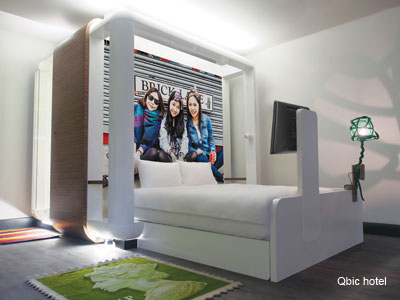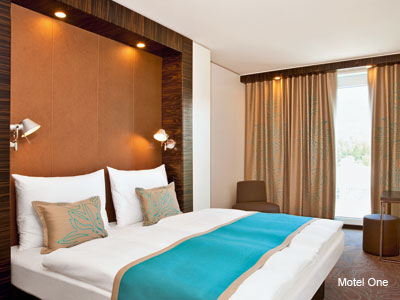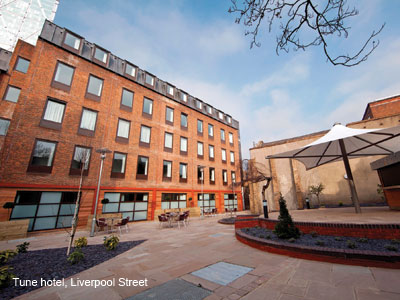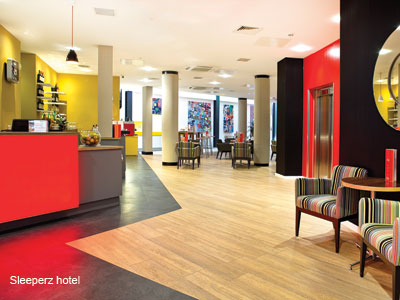Hotels – cheap but chic
Premier Inn and Travelodge may still dominate the budget hotel sector, but as demand for cheap, reliable accommodation continues beyond the recession, a new gang of cool, innovative brands have elbowed their way onto the scene. Rosalind Mullen reports
If consultant Melvin Gold's predictions are on the button, then by 2030 budget properties will comprise a chunky 26% of the UK hotel market.
hotels and 90,000 rooms between them.
The remaining 28 brands collectively have just 418 hotels in the UK, but nevertheless this equates to a sizeable 40,000 bedrooms. Among the welter of newer players are Citizen M, Qbic, Bloc, Motel One, Z Hotels, Sleeperz, Easyhotel, Tune and Yotel.
These hotels are proof that, in the 30 years since the first Travelodge opened in Burtonon- Trent, the demand for cheap and clean rooms has evolved. But today's budget-lovers don't just want cheap and clean, they also want cleverly designed, chic rooms with taken-forgranted add-ons, such as flat-screen TVs, free Wi-Fi and power showers.
The budget sector can thank the economic downturn for its popularity, encouraging cash-strapped customers to dodge the prices of full-service hotels. But as more brands jostle for business in the budget space, they are increasingly seeking to differentiate.
At one end of the scale, there's Yotel, offering compact 7 sq m 'cabins' and automated check-in from £32 a night, and at the other there's Á¼ber-cool Citizen M with 14 sq m rooms, a bar and a canteen, publishing rack rates of more than £150 a night and averaging £88.
And, of course, the big boys are also increasingly grabbing chunks of the market. IHG's Holiday Inn Express brand is the third largest budget brand in the UK with 123 hotels. Accor has 11,913 rooms across four budget brands: Ibis, Ibis Styles, Ibis Budget and Hotel F1.
Hampton Worldwide operates two 'affordable' limited-service brands in the UK: Hampton by Hilton, which has 14 properties, and Hilton Garden Inn, currently numbering five, with a sixth opening at Heathrow Airport.
To keep things fresh, Whitbread will unveil a second budget brand, with Hub by Premier Inn opening in September in London's St Martin's Lane. It will have compact room sizes and offer smart technology apps for check-in and check-out, light controls, concierge facilities and so on. Six more sites are planned for
London and Edinburgh.
As consumers continue to feed demand for this sector, so they can expect to find competitive brands looking for ever-more innovative ways to differentiate.
QBIC
The lowdown
Qbic launched its first chic-but-cheap hotel in Amsterdam's World Trade Center in 2007 with 82 bedrooms. It opened its 171-bedroom London City property in Shoreditch last October.
There are different categories of room, including Smart (no windows) and Cosy and Fun (an airy 20 sq m). The London hotel has 70% of its bookings from business guests, while in Amsterdam it is 50:50.
The USP
It all hinges on the Cubi - an all-in-one cubeshaped module in kit form that takes just two hours to assemble. Qbic uses the system to convert space in disused office buildings into futuristic-looking hotel rooms with minimum impact on the environment.
Instead of trying to mimic a home, the concept seeks to absorb the local vibe and create an experience that 'isn't at all like home'.
Furnishings are trendy and high quality and include a NaturalMat bed, rainfall showers, LCD TVs, high-speed internet and different coloured lighting to create moods. Tariffs at London City start at £69 a night.
How does it keep its prices down?
The Cubi system saves on new-build or conversion costs. In the Amsterdam hotel, development costs per room were between £9,500 and £11,800, plus the same again for services, corridors and lobby.
"It was slightly higher in London because we had to make local adjustments, but I hope to get it back down," says managing partner Paul Janmaat.
There is a self-service check-in, but there are 'lobby concierges' who can give information on restaurants and bars. Cleaners are outsourced.
Qbic serves complimentary tea, coffee and soup, and food and beverages are provided by vending machines. In Amsterdam the food is supplied by local bakeries and in London the charity Food Cycle is providing pop-up food stations in the lobby.
Hotels in the pipeline
Janmaat is planning four hotels in London in the next two years, with sites are being sought in Camden, Borough, Vauxhall and Southwark.
Development strategy
Qbic looks to expand using investors and is backed by Bridges Ventures. The aim is to continue converting office buildings using the Cubi system. Janmaat explains: "Up to 15% of office buildings in the UK are empty - even more in other cities. Our concept is an effective solution for building owners looking for
uses for their empty commercial property."
He expects no let-up in demand, even though the worst of the economic doldrums are behind us. "It's more to do with changes in how people travel. Look at air travel - Ryanair is now the biggest single airline in Europe."
MOTEL ONE
The lowdown
Chief executive Dieter MÁ¼ller opened the first Motel One in Germany in 2000. The Munich based company describes itself as a "luxury budget" operator with more than 40 hotels in Germany and Austria, one in Belgium, another in Amsterdam, three in the UK and more in the pipeline. In 2013, revenue rose by 18% to £162m from £138m in 2012 and EBITDAR increased to £92m from £78m.
The USP
Motel One's formula is based on location, price and quality, says marketing and PR director Ursula Schelle-MÁ¼ller. Each hotel is central, close to transport links and within walking distance of tourist attractions.
"The central locations, though, do not come with a big price tag. Rooms start from as little as £47, providing fantastic value for money," says Schelle-MÁ¼ller.
Equally, all materials are of a high quality - the towels or bed linen are the same as those in a four- or five-star hotel and all the designer furnishings are original.
Hotels in the pipeline
There are a total of 28 Motel Ones with 7,900 rooms under development. Four new hotels are set to join the three already in the UK: a 291-room hotel in Tower Hill, London (due to launch this year); a 330-room hotel in Manchester Picadilly (spring 2015); a 222-room hotel in Newcastle High Bridge (2016); and
a 374-room hotel in Glasgow (2016). Seven more are planned for mainland Europe.
Development strategy
In 2013, the balance sheet revealed that £52m of net debt (down from £35m in 2012) was related to financing pipeline project developments. Motel One either buys a property and keeps it in its own stock or rents it on a longterm lease of 20 years. As of last year, the company owned 20 properties and leased 26. The
company is working with major institutional investors and pension companies.
The financials
In 2013, EBITDAR rose to £92m from £78m, and the company recorded occupancy of 75%, up from 73% in 2012.
How does it keep prices down?
"Motel One focuses on the essentials: a comfortable night's sleep and a good start to the day. The key to low prices is the optimal use of the space you have," says Schelle-MÁ¼ller.
The rooms don't have phones or minibars (although there's a bar and lounge), but Motel One does provide free Wi-Fi and iPads in the lounge.
"Every budget brand varies greatly in what it offers guests. The perception of luxury is changing and means different things to different people," says Schelle-MÁ¼ller.
TUNE HOTELS
The lowdown
Tune Hotels is part of lifestyle business conglomerate Tune Group, founded in Malaysia in 2007 by Tony Fernandes and Kamarudin Meranun.
There are 42 hotels globally, including 13 in Malaysia, nine in Indonesia, eight in the Philippines, four in Thailand and one each in India, Japan and Australia.
Four of its five UK properties are in London - King's Cross, Paddington, Westminster and Liverpool Street - and there is one in Haymarket in Edinburgh.
The USP
Tune Hotels positions itself as a clean, comfortable place to stay in convenient locations. Aimed at budget-conscious, savvy travellers, the hotels have a funky design and the latest technology. The chain is being developed according to the limited service model of a low-cost airline (Fernandes founded Malaysian budget airline AirAsia X). It uses a self-service, demand based online booking system that encouragesguests to book early to get the lowest prices.
Rooms are space-efficient and the hotels have to tick the boxes on five core principles: five-star beds, power showers, central locations, cleanliness and 24-hour security.
It works on the basis that what consumers want from a hotel is a good night's sleep at a good price. Housekeeping services are provided, as are a 24-hour reception, CCTV systems and no access to the main lobby past midnight without a key card.
Hotels in the pipeline
Tune Hotels' fifth hotel in the capital will open at Canary Wharf with 130 rooms in November. Like the other London hotels, it will be run under a management contract.
In October it will unveil its Newcastle property, the first in England outside London. The £8.3m restoration of the Edwardian building will provide 104 bedrooms.
Elsewhere, more hotels are earmarked for the Middle East, Europe and Africa.
How does it keep its prices down?
Room rates start at £55 but go up to more than £100. Tune Hotels keeps prices low by not offering amenities such as restaurants, gyms and swimming pools. Unlike some comparable chains, it provides small-scale coffee and food facilities and 24-hour security. The cheapest rooms often have no windows.
Guests pay extra for Wi-Fi, TV and towels as part of its 'less waste, more Earth' pay-as-youuse system for energy-consuming services.
SLEEPERZ
The lowdown
Sleeperz founder Barry Munn opened the first hotel in Cardiff in 2008 with 74 bedrooms. This was followed by a 98-bedroom property in Newcastle in 2012.
Last year it launched a new brand, Cityroomz, in Edinburgh. Annual turnover is about £5m and growing.
The USP
Sleeperz are super-stylish, compact hotels located near railway stations in post-industrialcity centres that aim to tap into the independent train-traveller market. The buildings are new build or redeveloped and the first two have scooped RIBA awards for design excellence.
Sleeperz positions its hotels between the mainstream budget and quality mid-market. Chief executive David Myers says the main differentiator is that while the rooms are compact at about 15 sq m, they have made fewer compromises on style and service than the 'pod' brands.
"Our compact bedrooms are cleverly designed," says Myers. "They are the BMW mini of the hotel world, with workdesks, air-conditioning, free Wi-Fi and wet-rooms. Our public areas offer a great lounge-living experience with an all-day 'eatz and drinkz' menu, or you can unwind at our 24-hour bar."
How does it keep prices down?
"We can't offer concierge and room service, gyms and swimming pools and large function rooms," says Myers. "Apart from that, we offer everything you would expect from a four-star hotel, but it's much more affordable."
Development strategy
Under a deal with Network Rail, Sleeperz can develop its hotels on bits of irregularly-shaped disused land next to mainline rail stations that nobody else wants.
The first two hotels were financed from shareholder equity, but now the plan is to grow though FRI leases (where the tenant rather than the property owner has full responsibility for repairs and insurance).
Plans in the pipeline
In 2010, the company secured £7m of investment from Andre Hoffmann and Connection Capital and was set to grow to 10 sites by 2015, but the economic climate has slowed progress. Nevertheless, the company's fourth UK hotel is under way. It is being developed in partnership with Dundee Council, as part of the £1bn regeneration of the city's waterfront. The 120-room Sleeperz Dundee will be in a stylish, curved concourse above a £22m redeveloped rail station with views over the River Tay.
Sleeperz is set to open hotels in Glasgow, Aberdeen, London, Manchester, Liverpool and Bristol.
The tariff
Cardiff is offering a £69 B&B rate, but rack rates range from £79 to £110. Myers says the hotels tend to deliver about 10% revpar ahead of the competitive budget market set.
A second brand
In May 2013 the company launched Cityroomz, a rooms-based sister brand with limited food and beverage and lower rates starting at £49 a night. The first Cityroomz is a 72-bedroom hotel in Princes Street, Edinburgh, on the site of a former Travelodge.
"We saw this as a tremendous opportunity to enter the Edinburgh hotel market. The results speak for themselves with a considerable uplift in revpar and profit," says Myers.














